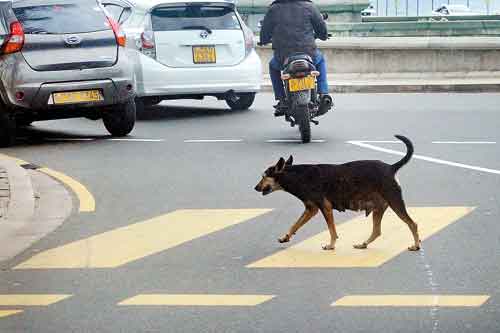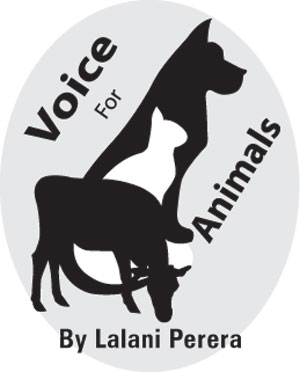“Val Ballo” or “Val Minissu”? -Stop insulting animals
View(s):
Guess who knows his road rules?
“Balla”, “balli”,“gona”, “haraka”, “mee-haraka”, “booruwa”, “garandiya”, “korawakka”, or in general, “thirisannnu” – these are terms we often hear – uttered by politicians to insult opponents or gangsters to display their false bravado or some others in various contexts. Even some parents and teachers call children“booruwa”scorning some learning difficulty, without realizing how this meaningless reference can cause irreversible damage to a child’s morale. Recently a TV news reader wondered whether our people’s representatives had arrived from the “saththuwatte”, while another commented that some of them should be used to draw “barakaraththa”.
Why compare humans to animals, when it makes no sense and serves no purpose and humans can actually be ridiculed for their own negative traits?
Dr. Arthur Saniotis, visiting research fellow at Adelaide University’s School of Medical Sciences and co-author of “The Dynamic Human” says: “For millennia, all kinds of authorities — from religion to eminent scholars — have been repeating the same idea ad nauseam, that humans are exceptional by virtue that they are the smartest….However, science tells us that animals can have cognitive faculties that are superior to human beings.” As Professor of Anthropological and Comparative Anatomy Maciej Henneberg, also of the same School of Medical Sciences says: “The fact that animals may not understand us, while we do not understand them, does not mean our intelligences are at different levels, they are just of different kinds. When a foreigner tries to communicate with us using imperfect, broken versions of our language, our impression is that they are not very intelligent. But the reality is quite different.”
It is nonsensical to refer to self-serving humans as cows, bulls or buffaloes who have faithfully served man for centuries drawing overloaded carts and ploughing fields; or dogs who unwaveringly protect their owners; or “garandiyas”who are harmless, unlike many humans who are a threat to their own species.
Scientific research continues to reveal the superior qualities and abilities of animals, not only in relation to their physical prowess, but also in relation to intelligence and morality. Here are some of these widely published findings:
Animals are capable of developing language and communication skills and tool usage, with elephants, dolphins, whales, apes and crows considered the most intelligent. Dogs remain faithful to their owners without shifting their allegiance for personal benefits. Elephants have incredible memories as do chickens – who if they could make promises would never forget them. Bitches protect not only their own precious pups, but also nurse those who have lost their mothers. Animals amass nothing, except what is necessary for their survival, while most humans avariciously accumulate everything possible, even illegally, forgetting that hoarded wealth cannot be carried to the “next world”. Meaningless violence, vindictiveness, cruelty and sadism common among humans are not found in animals.
 Animals such as parakeets and swans display true fidelity, remaining faithful to their partners, while humans are ever ready to break a relationship for the most trivial reason; pigeons find their way home from faraway distances without maps and a compass; some ant species reproduce via cloning; dolphins, bats, elephants, dogs and even rats are among the animals that can identify a sound’s location faster than a human. Eagles, sharks and horses possess better vision; dogs have a keener sense of smell; lobsters stay agile and fertile as they age; no human can match a cheetah or a hippopotamus for sheer speed; mice can adapt to almost any environment; sheep self-medicate, eating plants that can cure them; a fawn takes its first steps within twenty minutes of birth; donkeys have a highly developed sense of self preservation. Readers would have observed dogs diligently using pedestrian crossings to cross the road, whereas some humans do so while talking on mobile phones.
Animals such as parakeets and swans display true fidelity, remaining faithful to their partners, while humans are ever ready to break a relationship for the most trivial reason; pigeons find their way home from faraway distances without maps and a compass; some ant species reproduce via cloning; dolphins, bats, elephants, dogs and even rats are among the animals that can identify a sound’s location faster than a human. Eagles, sharks and horses possess better vision; dogs have a keener sense of smell; lobsters stay agile and fertile as they age; no human can match a cheetah or a hippopotamus for sheer speed; mice can adapt to almost any environment; sheep self-medicate, eating plants that can cure them; a fawn takes its first steps within twenty minutes of birth; donkeys have a highly developed sense of self preservation. Readers would have observed dogs diligently using pedestrian crossings to cross the road, whereas some humans do so while talking on mobile phones.
Sanctimonious humans who frequent places of religious worship – but do not follow the teachings of the Great Religious Founders should remember that all major world religions have positive attitudes towards animals. Universal Compassion being the tenet of Buddhism, Buddha taught us to treat humans and animals with equal respect. Hinduism advocates non-violence – the “Bhagawata Purana”, a principal text of Hinduism lays down that “deer, camel, donkey, monkey, rats, creeping animals, birds and flies – one should consider them as one’s own children.” In the words of Holy Prophet Mohammed “A good deed done to an animal is as meritorious as a good deed done to a human, while an act of cruelty to an animal is as bad as an act of cruelty to a human being.” Jesus was often surrounded by animals and he frequently used animals in his parables. But for some unintelligent mortals, in their attempts to mock humans, animals become objects of ridicule, unworthy of respect.
Animal rights activist Sharmini Ratnayake who untiringly devotes much of her time to rescuing and re-homing vulnerable puppies and kittens born on the streets or abandoned by heartless owners, tells people who want to adopt these puppies, but are curious to know whether they are “honda ballas” or “valballas”, that “there are no ‘val ballas’”, there are only “val minissu”.
Humans should mind their language; And learn from animals, instead of insulting these non-human sentient beings by comparing them to no-good humans.


